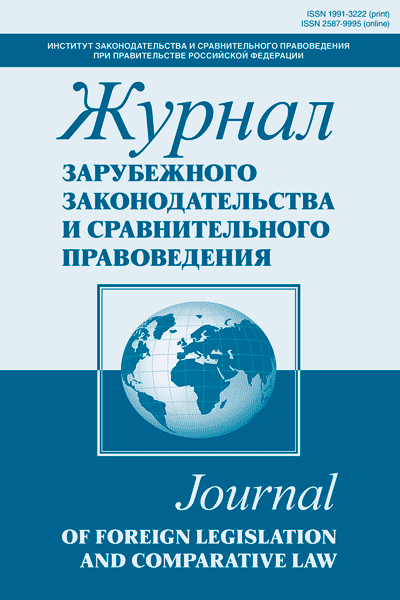employee from 01.01.2024 until now
The Urals State Law University (kafedra konstitucionnogo prava, professor)
Ekaterinburg, Russian Federation
In the modern context judicial authorities actively participate in the creation of legal norms acting as a negative legislator (repealing operation of an unconstitutional bill or abrogating a by-law). The article consistently reveals peculiarities of carrying out by judicial authorities of constitutional control over the “negative legislator’s” functions in the frame of Anglo-Saxon, American and European model. This activity is directly linked both with the right to interpret the provisions of the state’s Constitutional law, and the right to make decisions on compliance of legal norms with that law. Difference is possible in relation to the volume of interpretation, consequences of decision-making as part of the subsequent constitutional control, and also different roles of judicial bodies. The article analyzes in detail constitutional and legal sources of such countries as Great Britain, the USA, Germany, Austria, Italy, Spain, Japan, Israel and Switzerland. The article also investigates various points of view of Russian and foreign scientists on this topic. Investigation of peculiarities in the process of building-up and development of the constitutional justice institute in Islamic states is of particular interest. It is noted in the study that it is not only Kelsen model (constitutional courts) that act as a “negative legislator”, but also other traditional models of bodies of constitutional control. The “negative legislator’s” functions performed by a body of constitutional control are inherent to any well-known model of its implementation, they have common features and at the same time certain particularities, conditioned by the structure of a national legal framework.
Judicial authority, constitutional control, “negative legislator”, constitutional court, supreme court, amparo.
1. Bennion F. Statutory Interpretation. L., 1984.
2. Brest D. Congress as a Constitutional Decisionmaker. Georgia Law Review. 1986. No. 1.
3. Bustamante T. Evanilda de Godoi Bustamante Constitutional Courts as “negative Legislators”: The Brazilian Case. Revista Jurídica Piélagus. 2010.
4. Holmes O. Collected Legal Papers. Hartcourt, 1920.
5. Salmond J. Jurisprudence. L., 1907. 288. Scottish Legal System.
6. Bernam U. Pravovaya sistema SShA. Vyp. 3. M., 2006.
7. Garner D. Velikobritaniya: tsentral´noe i mestnoe samoupravlenie. M., 1982.
8. Zadvoryanskiy E. E. Osobennosti pravovogo statusa Verkhovnogo suda Izrailya kak organa sudebnogo konstitutsionnogo kontrolya: dis.... kand. yurid. nauk. M., 2012.
9. Kasas Baamonde M. E. Ispanskiy opyt. Vestnik Konstitutsionnogo cuda Respubliki Belarus´. 2010. № 3.
10. Klishas A. A. «Protsedura pryamogo amparo»: pravovye osnovy organizatsii i konstitutsionno-pravovoy yurisdiktsii. Rossiyskiy sledovatel´. 2006. № 5.
11. Kuznetsov V. F. Sudebnaya sistema Anglii i Rossii: sravnitel´nyy analiz. Vestnik Chelyabinskogo universiteta. 2004. № 1.
12. Matinyan M. A. Mesto i rol´ zakona v sisteme istochnikov prava Anglii. Obshchestvo: politika, ekonomika, pravo. 2008. № 2.
13. Polenina S. V. Sudebnyy pretsedent v Rossiyskoy Federatsii - real´nost´ i perspektiva. Predstavitel´naya vlast´. 2002. № 5-6.
14. Fridman L. Vvedenie v amerikanskoe pravo. M., 1992.
15. Epshteyn A. Sotsial´no-politicheskie posledstviya ukrepleniya statusa Verkhovnogo suda kak glavenstvuyushchey struktury v politicheskoy zhizni strany. Sovremennyy Blizhniy Vostok. 1999. № 8.
16. Yaag T. Konstitutsionnye sudy kak «pozitivnye zakonodateli»: opyt Shveytsarii. Vestnik Konstitutsionnogo suda Respubliki Belarus´. 2010. № 3.








